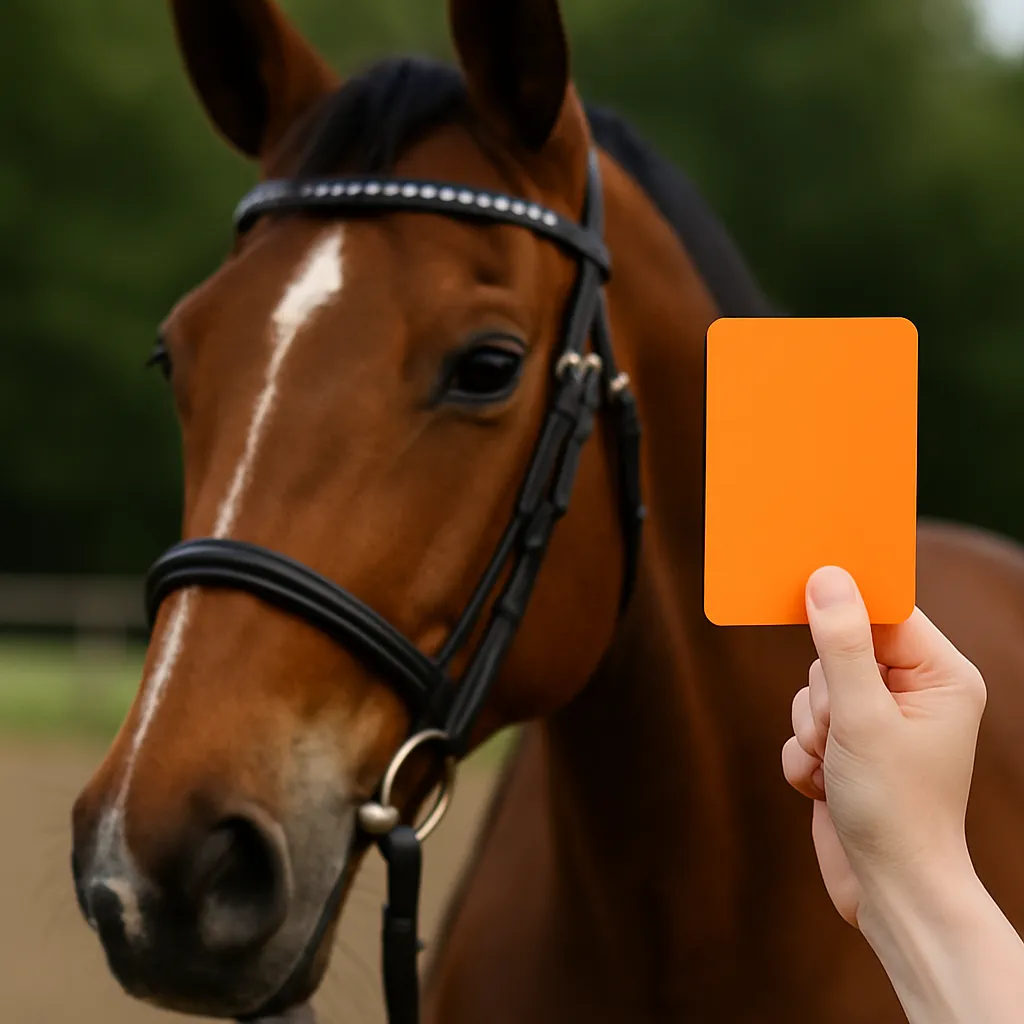
Operation Orange Card
Operation Orange Card – A New Way to Raise the Bar in NZ Horse Sport
In rugby, ten minutes in the sin-bin is the universal wake-up call for being a dick. In New Zealand equestrian sport, you pretty much have to burn the place down before a yellow card appears. That gap between a stern glare and full-blown disciplinary action is where horse welfare, sportsmanship, and our public image quietly bleed out.
It’s time for something new.
I’m calling it: Operation Orange Card.
The Problem with Yellow
Yes, we technically have yellow cards in equestrian sport. But let’s be honest — they’re rarely used. The threshold is so high that most poor behaviour gets ignored completely.
You can berate your horse, yell at your kid, scream at a steward, jump your horse in gear that should be banned — and chances are, nobody says a word. Unless it’s extreme, it’s just quietly tolerated.
And that tolerance? That’s exactly what erodes public trust, damages social licence, and leaves a trail of quietly compromised horses in its wake.
So What’s the Orange Card?
It’s a middle ground.
A quiet but formal way to say: “We saw that — and it’s not okay.”
Think of it like Star 555 for horses. In NZ, when you see someone driving like a maniac, you don’t call 111 — you call Star 555. Police comms take the report, and if needed, get a patrol car to follow up.
The Orange Card system would work the same way:
An email or number that anyone can report to — anonymously or named
One Chief Steward for the country overseeing reports (to avoid conflicts and buddy systems)
Weekly phone calls to those who’ve been reported, along the lines of:
“Hi Bob, we’ve received a report that at around 1 p.m. on Saturday at Taupō, you were seen doing XYZ in the yards. Just checking in about that.”
If Bob says “That never happened” — that’s fine. No punishment. No follow-up.
But now Bob knows someone’s watching. And sometimes that’s all it takes.
If Bob admits it — “Yeah… I did do that” — then the self-reflection is usually punishment enough.
And if Bob says:
“Look, I did lash out. But the horse was standing on my broken foot and I was in agony. I’m not proud of how I reacted — it wasn’t right.”
Then the steward can respond with something like:
“I understand, and it sounds like it was a tough moment. But we still need to hold ourselves to a higher standard. Let’s think more carefully about how we treat these sentient animals — especially in public.”
What If It’s More Serious?
If the reported behaviour is clearly out of line — say, a welfare issue or repeated inappropriate conduct — then the steward could issue a short stand-down, like three weeks off from competition.
But instead of punishment, that time would be used for education:
Completing an FEI or ESNZ-approved online module on horse welfare, ethical riding, or social licence
Providing proof of completion before returning to competition
This isn’t about shame. It’s about learning and improving.
It says: “We expect better — and we’ll help you get there.”
What If People Abuse the System?
The biggest fear I hear is:
“What if someone just doesn’t like me and tries to get me in trouble?”
“What if someone’s standards are different from mine?”
That’s exactly why there’s one national Chief Steward at the centre of the system.
Not local buddies, not stewards we’ve known for decades.
The steward filters out the fluff.
“You said they swore at their horse?” → Not worth a call.
“You saw them upper-cut their horse in the jaw?” → Definitely worth a call.
We’d also create clear, published guidelines for what is and isn’t Orange Card-worthy. That way, the expectations are transparent — not arbitrary.
What About Repeat Offenders?
Here’s where it gets more structured:
Two or three orange cards in six months, and the system escalates:
Formal yellow card issued
Longer stand-down
Further education required
It’s not about zero tolerance — it’s about pattern recognition.
If you keep popping up, something needs to change.
Why This Could Work
It’s quiet but effective – no drama, no public scenes, just private accountability
It’s low-cost – we already have stewards, phones, and FEI courses
It empowers bystanders – finally a way to report bad behaviour without fear
It shifts culture – because knowing you’re being watched changes everything
It aligns with social licence – shows the public we’re improving from within
My Own Reflection
I’ll be honest. I’ve been that rider who cracked under pressure.
Probably ten times. Maybe a hundred.
What stopped me? What made me better?
Someone quietly saying:
“Oi, take a breath. Your horse is trying his guts out for you.”
We are privileged to even be on the back of a horse.
They try harder for us than most people ever will.
We owe them respect — not just in the arena, but in every moment we handle them.
Let’s Talk
I’m not proposing perfection.
I’m proposing a nudge.
A reminder.
A reset.
And I believe this system — Operation Orange Card — could change the sport I love in just six months.
What do you think?
Would you support a trial like this in New Zealand equestrian sport?
👉 Drop me a line, share your thoughts, and let’s start a conversation that puts horses first — and still lets us compete, learn, and grow.
